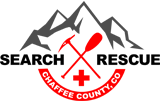Spencer McKee, Denver Gazette; Oct. 10, 2023
Among the highest reaches of Colorado, loose rock tends to be ample, making it crucial to proceed with extreme caution when above treeline.
A search and rescue response that took place near the end of September highlighted this risk, when a hiker on the 14,077-foot Mount Columbia was struck by a falling boulder, sustaining an injury and requiring emergency rescue via a helicopter.
At about 9:30 a.m. on September 25, Chaffee County Search and Rescue North got a request for help on the heavily-trafficked Collegiate Range peak. With the group able to provide their GPS location via a Garmin inReach device, the search and rescue team was able to insert a team member on a nearby ridge via helicopter, with this team member making contact with the group at about 11:50 a.m.
The rescue subject reported that he was hit by a rock that tumbled down from above on the mountainside, which resulted in a likely lower arm fracture and an open laceration.
While no additional rescuers were needed at the scene, a Helitack helicopter was rescued to bring the rescue subject and search and rescue team member from the technical terrain. By 1:30 p.m., both people were safely extracted and back at the aircraft bay. The subject was transported via Chaffee County EMS to Salida for treatment.
Additional information about the condition of the rescue subject was not released, but given that the incident involved an arm fracture, it’s likely the patient will make a recovery. That being said, a situation like this is a good reminder that it could have been much worse – imagine if it was the head instead of an arm that was struck.
It’s also worth noting that the standard summit-bound climb up Mount Columbia is rated as class two with ‘moderate’ rockfall potential – in other words, most people climbing this peak probably aren’t wearing a helmet or really considering that rockfall risk is something they’ll be actively dealing with. This goes to show that even when rockfall risk may not be a common hazard on a certain stretch of terrain, it’s still something to be constantly aware of as failing to dodge a falling rock can have dire and deadly consequences.
Bringing along a mountaineering helmet for technical terrain is never a bad idea. These helmets tend to be lightweight and easy to strap to a pack when not in use. It’s also always important to keep an eye on rocks uphill, as spotting tumbling boulders is always better if done sooner than later.
Thankfully, the outcome of this situation was a relatively good one considering how bad it could have been had the rock bounced in a slightly different way.
If you’re interested in supporting Colorado’s volunteer-powered search and rescue operation, one way to do so is through the purchase of a CORSAR card. It’s cheap, at only $3 per year.

